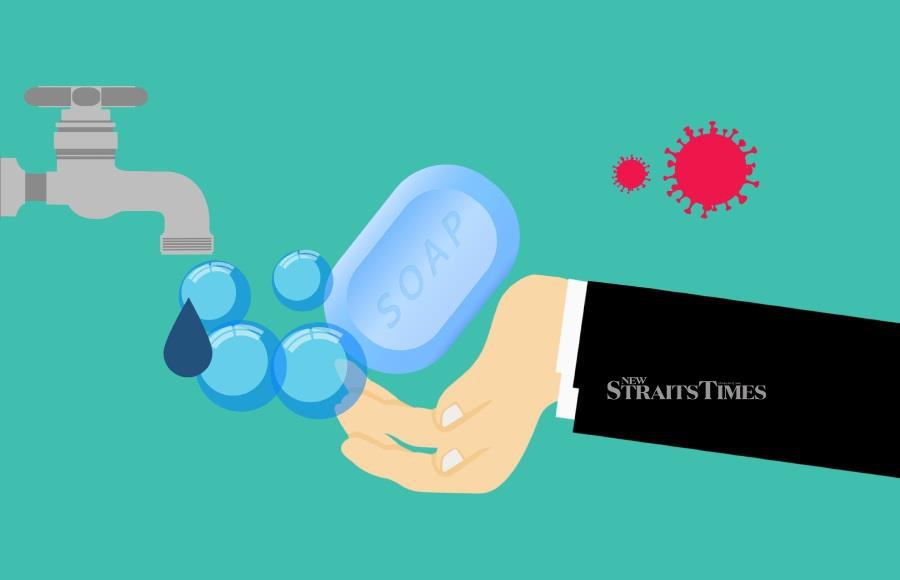SINCE the pandemic broke out last year, we've been ordered to wash our hands and sanitise them, in addition to keeping a social distance as well as donning a mask when we're in public places.
Hand hygiene isn't anything new. It's a practice that has kept us safe from common illnesses and infections. The importance of hand hygiene through washing with soap and water and then sterilising with alcohol was established as far back as the mid-1800s.
There was a drop in the rate of sepsis and its associated mortality when medical staff washed their hands between examining women during childbirth. Hands have been found to be the principal route by which cross infection occurs.
Through the years, three levels of hand hygiene were recommended for the different tasks required — for social/routine hand hygiene (soap and water); antiseptic hand hygiene (wash with soap and water followed by sanitising with antiseptic agent); and surgical hand hygiene (all that plus removing all wrist watches and jewellery, keeping short fingernails with no nail varnish or false nails, and scrubbing with soft, sterile nail brush).
Yet, despite all these warnings, people still cough and sneeze openly, or cover with their hand but not washing/sanitising it immediately after. Even if you sneezed into tissues and properly dispose them in the trash, you still have to wash your hands immediately followed by a squirt of sanitiser.
Coughing/sneezing into your elbow helps to prevent your hands from being contaminated. At first I didn't understand the logic behind this. But since the pandemic, so many articles and documentaries have been made on this topic that it has become a recommended practice.
CHANGING TIMES
For years before this, we've been able to get away quite lightly without proper and diligent hand hygiene. We might carry a small bottle of sanitiser when travelling or when eating out but most times, not. At the most we'd suffer stomachache, diarhhoea or even pink eye.
How things have changed! Today, it's of utmost importance that we practise proper hand hygiene to fight the spread of diseases, especially Covid-19. No one leaves home without a bottle of sanitiser on them these days.
Practising hand hygiene is a simple yet effective way to prevent infections. This is especially important when you have people with special needs (regardless of age), children, and elderly loved ones in your care. Their immune system may not be as strong, and they may have other underlying health issues like asthma, heart disease and diabetes.
Children are prone to coughs, colds and flu while they're growing up because that's how their body builds up their immune system. While there are flu shots that we could take annually to prevent a full-blown episode, there aren't any vaccines against the common cold.
We shouldn't overlook the effects of the common cold on our elderly relatives. A bad bout of cold could severely affect their respiratory system just like flu. Don't visit them if you're unwell and be more mindful and careful about what we expose our elderly loved ones to.
DO GLOVES PROTECT?
Some people feel that in addition to wearing a mask, wearing gloves when going out to run errands gives them added protection. The Centres for Diseases Control and Prevention (CDC) says otherwise: Wearing gloves is no substitute for proper hand washing and sanitising. Any contaminated thing you touch with gloved hands can pass on germs in much the same way as dirty hands.
We may not realise it but we do tend to touch our eyes, nose and mouth. Germs can get into our body through these routes and make us sick. You might think you're emulating medical staff who wear gloves when handling patients while they provide care. What you need to know is that they remove and throw away those gloves immediately after attending to that patient, clean their hands and put on new gloves for the next patient.
By the same token, wear gloves when caring for your ailing loved one at home, especially when handling wounds, and when touching or having contact with bodily fluids like blood, faeces, urine, vomit, saliva and mucus. Also use gloves when cleaning and disinfecting areas in the house and around the person who's sick, as well as surfaces frequently touched in the home.
According to CDC: "Wearing gloves outside of these instances (for example, when using a shopping cart or using the ATM) will not necessarily protect you from getting Covid-19. Germs could still be spread."
CDC recommends that the best way to protect yourself from germs when running errands and after going out is to regularly wash your hands with soap and water for 20 seconds or use hand sanitiser with at least 60 per cent alcohol.
[The views expressed in this article are the writer's own.]
Putri Juneita Johari volunteers for the Special Children Society of Ampang. She can be reached at juneitajohari@yahoo.com.
Redeem additional price cuts on personal hygiene essentials with Shopee Voucher.





